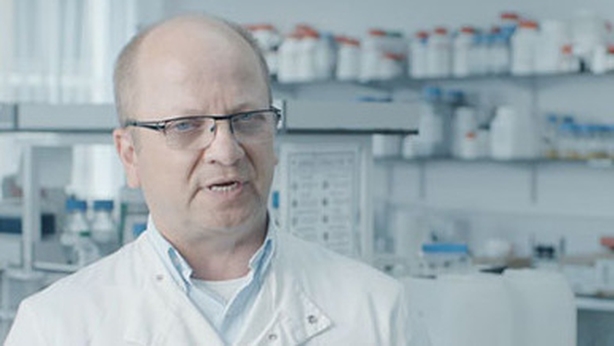Scientists believe they may have discovered a new way to combat the Covid-19 virus.
An international team from Bristol University believes that small molecule anti-viral drugs could be developed to help stop the virus from infecting human cells.
Sars-CoV-2 is the virus that causes Covid-19.
The scientists have found a "druggable" pocket within a Sars-CoV-2 spike protein which they hope could lead to new anti-viral drugs to shut down and eliminate the virus before it enters human cells.
They describe the findings, published in the Science journal, as a potential "game changer" in defeating the current pandemic.
Ireland among 156 nations in global plan for Covid-19 vaccines
Read more coronavirus stories
Spike proteins, which are on the surface of the virus, are a key element for infections of the human cells.
The researchers found a small molecule, linoleic acid, buried in a tailor-made pocket within the spike protein.
Linoleic acid (LA) is a free fatty acid, which is needed for many cellular functions and cannot be produced by the human body.
LA plays a vital role in inflammation and immunity levels, and it is also needed to maintain cell membranes in the lungs to help people breathe properly.
Professor Imre Berger said: "Our discovery provides the first direct link between LA, Covid-19 pathological manifestations and the virus itself.
"The question now is how to turn this new knowledge against the virus itself and defeat the pandemic."
The team used a powerful imaging technique, called an electron cryo-microscopy (cryo-EM), to analyse the Sars-CoV-2 spike.
A 3D structure of the Sars CoV-2 spike protein was generated allowing the researchers to peer deep inside the spike and identify its molecular composition.
The researchers spotted LA in a pocket within the spike protein. Prof Berger described the research team as having been "truly puzzled" by the discovery and its implications.

Prof Berger said: "So here we have LA, a molecule which is at the centre of those functions that go haywire in Covid-19 patients, with terrible consequences.
"And the virus that is causing all this chaos, according to our data, grabs and holds on to exactly this molecule - basically disarming much of the body's defences."
The team have found hope from previous studies on the rhinovirus, which is a virus that causes the common cold.
They said that a similar pocket was exploited to develop potent small molecules which were successfully used as anti-viral drugs in human trials in a clinic.
The Bristol team hope a similar strategy can now be used to develop small molecule anti-viral drugs against Sars-CoV-2.
The team included experts from Bristol UNCOVER Group, Bristol biotech Imophoron Ltd, the Max Planck Institute for Biomedical Research in Heidelberg, Germany and Geneva Biotech Sàrl, Switzerland.

